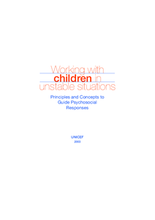During times of natural disasters and social emergencies, individuals and communities are subjected to great strain. The effects of such disasters on individuals and families vary considerably. In the context of these disasters, children and families actively engage in the rebuilding of their lives. Such experiences have a heavy cost on people, with individuals frequently experiencing strong emotions such as grief and loss, extreme anger, vengeance, mistrust and fear. It is essential that these feelings are not ignored while homes are rebuilt and social structures re-established and livelihoods recommenced.
‘Working with Children in Unstable Situations’ will explore the impact of unstable situations on children and their families. This document is designed to provide UNICEF staff and UNICEF partner staff with principles and concepts that can assist them to respond to the psychosocial needs of children in natural disasters and social emergencies such as armed conflict and other forms of violence. It aims to introduce humanitarian workers to psychosocial principles and UNICEF’s position on these principles. It also provides a number of examples from field work of how these principles have been turned into concrete actions. These psychosocial principles and concepts inform both emergency responses and subsequent programmatic responses post-emergency.
‘Working with Children in Unstable Situations’ is not a day-to-day programming tool. Rather, it is a manual outlining UNICEF’s orientation to the psychosocial principles integral to any work with children in unstable settings. The material in ‘Working with Children in Unstable Situations’ is for humanitarian workers who want to know more about assisting children to manage their own lives in uncertain and unstable situations.
©UNICEF

